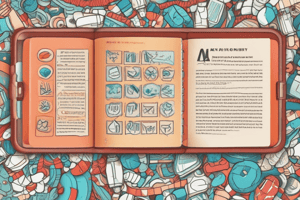Podcast
Questions and Answers
What percentage of American adults take five or more medications?
What percentage of American adults take five or more medications?
- 12%
- 42%
- 29% (correct)
- 55%
Which of the following drugs has the highest reported incidence of adverse drug events among patients over 65 years of age?
Which of the following drugs has the highest reported incidence of adverse drug events among patients over 65 years of age?
- Statins
- Anticoagulants (correct)
- Opioids
- Antibiotics
What is the primary cause of drug overdose deaths in the United States as reported in 2020?
What is the primary cause of drug overdose deaths in the United States as reported in 2020?
- Heroin
- Benzodiazepines
- Opioids (correct)
- Alcohol
Which type of toxicity is characterized as predictable due to excessive pharmacological action?
Which type of toxicity is characterized as predictable due to excessive pharmacological action?
What type of adverse effect results from a person's unique genetic makeup or alterations in drug metabolism?
What type of adverse effect results from a person's unique genetic makeup or alterations in drug metabolism?
Which of the following statements is true regarding drug interactions?
Which of the following statements is true regarding drug interactions?
Which adverse effect is classified as potentially life-threatening?
Which adverse effect is classified as potentially life-threatening?
In the treatment of diarrhea, what is considered a desirable effect of anti-histamines?
In the treatment of diarrhea, what is considered a desirable effect of anti-histamines?
What is indicated by a confidence interval (CI) of the test being within 0.8 and 1.25 when determining bioequivalence?
What is indicated by a confidence interval (CI) of the test being within 0.8 and 1.25 when determining bioequivalence?
What issue arises when switching from Drug C to Drug B based on AUC values?
What issue arises when switching from Drug C to Drug B based on AUC values?
Which of the following statements about the bioequivalence definition is true?
Which of the following statements about the bioequivalence definition is true?
In a scenario where Drug A has an AUC of 1, Drug B has an AUC of 0.8, and Drug C has an AUC of 1.25, which of the following is a logical conclusion?
In a scenario where Drug A has an AUC of 1, Drug B has an AUC of 0.8, and Drug C has an AUC of 1.25, which of the following is a logical conclusion?
How does a phase III study help in the context of bioequivalence?
How does a phase III study help in the context of bioequivalence?
What was the primary reason for the withdrawal of Thalidomide from the market in 1961?
What was the primary reason for the withdrawal of Thalidomide from the market in 1961?
Which of the following conditions has Thalidomide been used to treat today?
Which of the following conditions has Thalidomide been used to treat today?
What significant regulatory change occurred after the Thalidomide tragedy in the 1960s?
What significant regulatory change occurred after the Thalidomide tragedy in the 1960s?
What adverse effects were associated with Diethylstilboestrol (DES) upon its use?
What adverse effects were associated with Diethylstilboestrol (DES) upon its use?
What was one of the roles of the Risk Evaluation & Mitigation Strategy (REMS) in relation to Thalidomide?
What was one of the roles of the Risk Evaluation & Mitigation Strategy (REMS) in relation to Thalidomide?
Which of the following was a factor that contributed to the source of adverse drug effects (ADEs)?
Which of the following was a factor that contributed to the source of adverse drug effects (ADEs)?
What notable characteristic did Thalidomide have compared to other sedatives at its introduction?
What notable characteristic did Thalidomide have compared to other sedatives at its introduction?
What was the position of drug regulation during the 1950s that allowed for toxic drugs to be marketed?
What was the position of drug regulation during the 1950s that allowed for toxic drugs to be marketed?
What is a probable cause of API-mediated toxicity in patients?
What is a probable cause of API-mediated toxicity in patients?
How does chronic administration of certain medications affect drug metabolism?
How does chronic administration of certain medications affect drug metabolism?
What effect does the co-administration of multiple drugs with similar metabolism pathways typically have?
What effect does the co-administration of multiple drugs with similar metabolism pathways typically have?
What is required for the effective treatment of paracetamol overdose?
What is required for the effective treatment of paracetamol overdose?
What characteristic of idiosyncratic toxicity makes it challenging to identify?
What characteristic of idiosyncratic toxicity makes it challenging to identify?
Why was coumarin banned as a foodstuff by the FDA?
Why was coumarin banned as a foodstuff by the FDA?
What is a common issue with API degradation over time?
What is a common issue with API degradation over time?
What consequence arises from the presence of contaminants in APIs?
What consequence arises from the presence of contaminants in APIs?
What is the primary reason generic drugs can differ from their branded counterparts after patent expiration?
What is the primary reason generic drugs can differ from their branded counterparts after patent expiration?
What is an example of a substance that acts as an inhibitor of CYP450 enzymes?
What is an example of a substance that acts as an inhibitor of CYP450 enzymes?
Flashcards are hidden until you start studying
Study Notes
Adverse Drug Events (ADE)
- 82% of American adults take at least one medication, and 29% take five or more
- In 2016, the age-adjusted rate for drug-poisoning deaths for males (26.2 per 100,000) was almost double that of females (13.4)
- In 2020, 91,799 drug overdose deaths occurred in the United States (28.3 per 100,000 people)
- 75% of these involved opioids
- ADEs include medication errors, allergic reactions, and overdoses.
Other Causes of ADE
- The incidence of ADEs is 4 per 1000
- Antibiotics account for 16% of ADEs, with allergies being the most common
- Anticoagulants are responsible for 32% of ADEs in patients over 65 years of age
- Warfarin, rivaroxaban, and dabigatran are among the top 10 causes of ADEs
- Phenytoin (anti-seizure medication) exhibits zero-order kinetics
- Opioid analgesia has a higher death rate than heroin
- Insulin can also cause ADEs
Types of Toxicity - Mechanisms
- Pharmacodynamic toxicity (predictable)
- Excessive pharmacological action
- Alternative pharmacological action (e.g., Aspirin can cause bleeding while having anti-inflammatory effects)
- Overdose toxicity
- Pharmacokinetic (unpredictable?)
- Induction/inhibition/competition of P450 enzymes
- Idiosyncratic
- Allergic response
- Hyperthermia with general anaesthetics
- Withdrawal
- Steroid, beta blocker, anti epileptic, PPI withdrawal
Thalidomide
- Marketed as a sedative in 1957 (Germany)
- Found to be an effective antiemetic (off-label use for morning sickness)
- Withdrawn in 1961 due to teratogenic effects (prevents angiogenesis)
- Not tested on pregnant animals (species dependent: mice less sensitive than humans)
Thalidomide Today
- Used as an immunomodulator to treat various conditions including:
- Hansen’s disease (Leprosy)
- Cancer
- Graft versus host disease in children
- HIV mouth ulcers & wasting
- Prescribed under a Risk Evaluation & Mitigation Strategy (REMS, FDA)
Diethylstilboestrol (DES)
- Non-steroidal oestrogen
- Approved by the FDA in 1947 to prevent miscarriage, treat oestrogen deficient states, and as a post-coital contraceptive
- Banned in chickens in 1959/66
- Classified as a teratogen in 1971
DES Teratogenicity
- DES Daughters:
- Increased risk of developing clear cell adenocarcinoma (CCA) of the vagina and cervix, breast cancer
- Pregnancy-related problems: miscarriage, stillbirth, ectopic pregnancy, premature labor, preeclampsia
- DES Sons and Grandsons:
- Urogenital abnormalities (e.g., hypospadia)
- DES Grandchildren:
- Infertility
- Cerebral palsy
Drug Regulation in the 1950s
- Very little formal regulation, mostly at the discretion of pharmaceutical companies
- No teratogenicity studies required
- Thalidomide was not approved by the FDA (not used in the United States)
- The thalidomide incident changed the global regulatory environment.
Source of ADEs
- Active Pharmaceutical Ingredient (API)
- API-mediated toxicity is due to a species-specific effect or a metabolite, possibly species-specific
- Toxicity may only occur in a small number of patients (pharmacogenetics)
- Contaminants
- Due to synthesis or degradation of API
- Excipients
- Used to bulk up, stabilise, surface coat, colour, or flavour
- Propellants (e.g, CFCs)
- Replaced with HFCs after the Montreal Protocol 1987
Cytochrome P450 (CYP) Enzymes
- CYP enzymes metabolise medications
- Chronic administration can induce hepatocytes to produce larger amounts of drug-metabolising enzymes
- Enzyme induction accelerates drug metabolism, requiring larger doses of the drug or potentially leading to overdose
- Apparent inhibition can occur with concurrent administration of two or more drugs that compete for the same metabolising enzymes
Bioequivalence
- Generics need to show bioequivalence with approved products in a small number of healthy volunteers
- Bioequivalence is usually measured by comparing Cmax and AUC between two products
- Defined as a confidence interval (CI) of test within 0.8 and 1.25 of reference
- Switching between generics with different AUC could significantly alter the effective dose for a patient, potentially leading to therapeutic failure or adverse effects.
Idiosyncratic Toxicity
- Dose-independent
- Often due to genetic polymorphisms (e.g., CYP polymorphisms)
- Difficult to identify
Coumarin
- High level of hepatotoxicity in rats, but low level of toxicity in humans (0.37%)
- Banned as a foodstuff by the FDA in 1954 (considered a carcinogen)
- Re-analysis of rat data suggests that the hepatic lesion was cholangiofibrosis (bile duct proliferation) and not cholangiocarcinoma
Generics
- After a drug’s patent lapses (20 years)
- Are generics the same as branded products?
- Bioequivalence refers to the absence of a significant difference in the rate and extent to which the active ingredient or active moiety becomes available at the site of drug action
Contaminants
- While a very pure form of the API is used, by-products from synthesis might still exist. These can be batch specific or due to manufacturing changes
- API can degrade over time influenced by storage conditions (heat, light, humidity) leading to a reduced dose and potentially toxic by-products.
Ranbaxy & Dr Reddy
- Ranbaxy: Indian generic pharmaceutical company with multiple violations of regulations and product recalls.
- Dr Reddy: Found to have contaminated Ranitidine, Valsartan, Losartan, and Irbesartan products with N-Nitrosodimethylamine (NDMA), a known carcinogen.
Studying That Suits You
Use AI to generate personalized quizzes and flashcards to suit your learning preferences.




